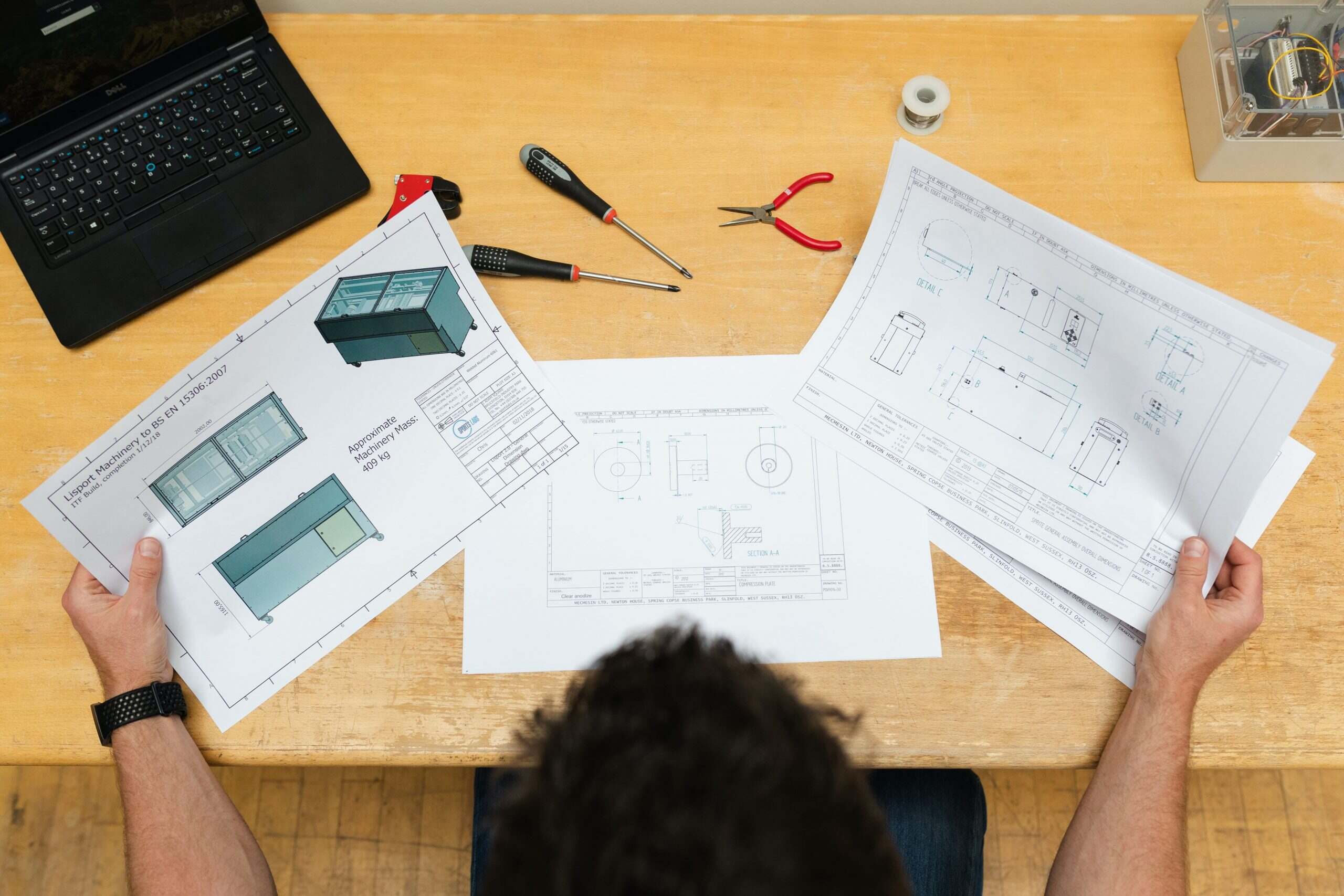Home>diy>Planning & Engineering>How To Get A Civil Engineering Job


Planning & Engineering
How To Get A Civil Engineering Job
Modified: January 9, 2024
Learn how to secure a civil engineering job with a focus on planning engineering. Gain the skills and knowledge needed to stand out in the competitive job market.
(Many of the links in this article redirect to a specific reviewed product. Your purchase of these products through affiliate links helps to generate commission for Storables.com, at no extra cost. Learn more)
Introduction
So, you’ve decided to pursue a career in civil engineering. Congratulations! Civil engineering is a dynamic and rewarding field that plays a crucial role in shaping the world we live in. From designing bridges and highways to constructing buildings and infrastructure, civil engineers are responsible for creating the physical foundations of modern society.
However, getting a civil engineering job can be competitive, as the industry continues to evolve and demand for skilled professionals remains high. In this article, we will guide you through the process of securing a civil engineering job, providing you with valuable insights and strategies to help you navigate the job market successfully.
Before we dive into the specifics, it’s important to understand that civil engineering is a highly specialized discipline that requires a solid educational foundation and relevant experience. Employers typically seek candidates who possess a blend of technical knowledge, problem-solving skills, and the ability to work efficiently within a team.
So, let’s explore the essential steps you need to take to increase your chances of landing a civil engineering job that aligns with your professional goals and aspirations.
Key Takeaways:
- Securing a civil engineering job requires a blend of education, experience, networking, and effective job search strategies. Crafting a strong resume and preparing for interviews are crucial steps to stand out in the competitive job market.
- Continuous professional development is essential for staying relevant and competitive in the dynamic field of civil engineering. Embracing opportunities for learning, networking, and skill enhancement can pave the way for a fulfilling career.
Read more: How To Get Civil Engineering Jobs In Dubai
Education and Qualifications
Earning a bachelor’s degree in civil engineering is the first crucial step towards launching your career in this field. A four-year undergraduate program will provide you with a solid foundation in fundamental engineering principles and concepts. It will also offer specialized courses in areas such as structural engineering, transportation engineering, geotechnical engineering, and environmental engineering.
While pursuing your degree, it’s important to maintain a strong academic record and actively participate in internships or cooperative education programs offered by your institution. These practical experiences will not only enhance your understanding of real-world engineering practices but also provide invaluable networking opportunities.
Additionally, consider obtaining professional certifications and licenses to further bolster your qualifications. In many countries, civil engineers are required to be licensed to practice in the field. The specific requirements for licensure may vary, but they generally involve a combination of education, work experience, and passing a standardized examination.
Continuing education is also essential in this industry, as civil engineering principles and technologies constantly evolve. Pursuing advanced degrees, attending workshops, and participating in professional development courses will demonstrate your commitment to staying current in the field and further enhance your employability.
Lastly, remember that a strong academic background and relevant qualifications are crucial, but they are only part of what employers look for. Earning your degree and obtaining certifications should be accompanied by gaining practical experience and showcasing your skills through internships, projects, or research opportunities.
Gaining Relevant Experience
In the field of civil engineering, practical experience is vital to set yourself apart from other job candidates. While your academic qualifications serve as a strong foundation, real-world experience demonstrates your ability to apply theoretical knowledge to practical situations.
One way to gain relevant experience is through internships or cooperative education programs. These opportunities allow you to work alongside experienced professionals in the industry and gain hands-on experience in various aspects of civil engineering. Internships not only provide valuable technical skills but also help you develop teamwork, problem-solving, and communication skills in a professional setting.
Additionally, consider volunteering for projects or organizations related to civil engineering. This can include working on community development initiatives, participating in sustainable construction projects, or assisting non-profit organizations with infrastructure-related challenges. Volunteering not only allows you to give back to the community but also helps you develop a well-rounded skill set and network with professionals in the field.
Another effective way to gain relevant experience is to participate in research projects or assist professors with their ongoing studies. Research opportunities expose you to cutting-edge technologies and methodologies in civil engineering, allowing you to deepen your knowledge and showcase your ability to contribute to advancements in the field.
Lastly, don’t underestimate the power of networking. Attend industry conferences, seminars, and workshops to connect with professionals in the civil engineering field. Engage in conversations, ask for advice, and express your interest in gaining practical experience. These connections can lead to valuable mentorship opportunities or even job referrals.
By strategically seeking out and actively participating in these experiences, you will not only gain practical knowledge and skills but also demonstrate to potential employers your passion and dedication to the field of civil engineering.
Building a Strong Resume
When it comes to securing a civil engineering job, your resume is your first opportunity to make a positive impression on potential employers. A well-crafted resume will highlight your skills, experiences, and qualifications, effectively showcasing why you are the ideal candidate for the position.
Here are some tips to help you build a strong resume:
- Format it effectively: Use a clean and professional format, with clear headings and bullet points to organize your information. Keep the resume concise, typically one to two pages in length.
- Include a summary or objective statement: Begin your resume with a brief summary or objective statement that highlights your key qualifications and career goals. Tailor this statement to align with the specific job you are applying for.
- Emphasize your technical skills: Civil engineering requires a range of technical skills, so highlight your proficiency in areas such as design software, data analysis, project management, and structural analysis.
- Showcase relevant experience: List any internships, cooperative education programs, volunteer work, or research projects that are pertinent to the job you are applying for. Describe your responsibilities and achievements in each role, focusing on how you contributed to successful outcomes.
- Highlight your academic achievements: Include information about your education, including your degree, university, and any notable academic achievements or honors. If you have obtained professional certifications or licenses, list them here as well.
- Demonstrate soft skills: Civil engineering requires not only technical expertise but also strong communication, problem-solving, and teamwork skills. Include examples of how you have demonstrated these skills in your previous experiences.
- Include relevant projects: If you have worked on notable projects during your education or internships, highlight them in a separate section. Briefly describe the projects, your role, and the outcomes achieved.
- Proofread and edit: Before submitting your resume, thoroughly proofread it to catch any errors or typos. Ask a trusted friend or mentor to review it as well, as a fresh set of eyes can often spot mistakes that you may have missed.
Remember, your resume should be tailored to each job application. Analyze the job description and identify the key skills and experiences the employer is seeking, then customize your resume to highlight those specific qualifications.
A strong resume will help you stand out from the competition and increase your chances of getting called for an interview.
Networking and Industry Connections
Networking plays a significant role in any job search, and the field of civil engineering is no exception. Building meaningful connections within the industry can open doors to job opportunities, provide valuable insights, and help you stay updated with the latest trends and advancements in the field.
Here are some strategies to effectively network and build industry connections:
- Join professional organizations: Research and join civil engineering associations and societies, such as the American Society of Civil Engineers (ASCE), the Institution of Civil Engineers (ICE), or the Canadian Society for Civil Engineering (CSCE). Attend their events, conferences, and workshops to meet fellow professionals and establish connections.
- Attend career fairs and industry events: Make it a point to attend career fairs specific to engineering and civil engineering. These events attract industry professionals and recruiters who are actively seeking talented individuals. Bring copies of your resume and engage in conversations with potential employers.
- Utilize online networking platforms: Create a professional profile on platforms such as LinkedIn and connect with civil engineering professionals. Join relevant groups and actively participate in discussions to expand your network and interact with industry experts.
- Reach out for informational interviews: Request informational interviews with professionals in the field to gain insights into their career paths and industry experiences. This not only helps you gather valuable knowledge but also allows you to establish connections with people who may be able to assist you in your job search.
- Stay connected with classmates and alumni: Maintain connections with fellow classmates and alumni from your university who are working in the civil engineering industry. Attend alumni events and reach out to them for advice, potential job leads, or referrals.
- Participate in industry-specific forums and discussions: Engage in online forums or discussion boards that focus on civil engineering topics. Contribute to the conversations, ask questions, and share your knowledge. This not only helps you build visibility within the industry but also allows you to connect with professionals who share similar interests.
Remember, networking is a two-way street. It’s not just about what you can gain from others, but also what you can offer. Be proactive in supporting and assisting others in their professional endeavors as well.
By actively networking and building industry connections, you increase your chances of hearing about job opportunities, gaining insider insights, and receiving recommendations from trusted professionals. These connections can make a significant difference in your civil engineering career.
Networking is key in the civil engineering industry. Attend industry events, join professional organizations, and connect with professionals on LinkedIn to increase your chances of finding job opportunities.
Job Search Strategies
Searching for a civil engineering job can be a daunting task, but with the right strategies in place, you can streamline the process and increase your chances of finding the right opportunity. Here are some effective job search strategies:
- Utilize online job portals: Explore online job portals and engineering-specific websites to find job postings tailored to the field of civil engineering. Popular job boards such as Indeed, Glassdoor, and LinkedIn often have a wide range of engineering positions available.
- Network with industry professionals: Leverage your networking efforts to uncover hidden job opportunities. Inform your connections that you are actively seeking a civil engineering position and ask if they know of any openings or can refer you to relevant contacts.
- Research and target specific companies: Identify companies or organizations that align with your career goals and values. Explore their websites, social media pages, and job boards to discover any open positions or future hiring plans.
- Attend industry-specific career fairs: Career fairs focused on engineering and civil engineering are excellent opportunities to meet potential employers face-to-face. Come prepared with copies of your resume and engage in meaningful conversations that highlight your skills and qualifications.
- Work with recruitment agencies: Consider partnering with recruitment agencies that specialize in engineering placements. These agencies have connections with various companies and can help match your skills with suitable job opportunities.
- Stay updated with industry news and developments: Subscribe to industry publications, newsletters, and websites to stay informed about the latest news, projects, and advancements in the field. This knowledge can not only help you in interviews but also showcase your genuine interest in the industry during networking and job search activities.
Additionally, when applying for jobs, it’s important to customize your application materials for each opportunity. Tailor your resume and cover letter to highlight the specific skills and experiences that align with the job description. Include keywords related to civil engineering to increase the chances of your application being selected by automated screening systems.
Don’t forget to follow up on applications and interviews. Send thank-you notes or emails to interviewers expressing your appreciation for their time and reiterating your interest in the position. This thoughtful gesture can set you apart from other candidates and leave a lasting impression.
Lastly, maintain a positive mindset throughout your job search journey. Rejections are a normal part of the process, and it’s important not to become discouraged. Stay persistent, continue learning and improving your skills, and sooner or later, you will find the right civil engineering job for you.
Interview Preparation
Securing an interview for a civil engineering job is an exciting opportunity to showcase your skills and qualifications. Proper interview preparation is key to making a positive impression and increasing your chances of receiving a job offer. Here are some tips to help you prepare for your civil engineering job interview:
- Research the company: Gain a thorough understanding of the company, its projects, and its values. Visit their website, review their recent projects, and familiarize yourself with their mission and goals. This knowledge will enable you to tailor your answers to align with the company’s specific needs.
- Review technical concepts: Brush up on core technical concepts related to civil engineering, such as structural analysis, transportation planning, geotechnical engineering, and environmental impact assessment. Be prepared to answer technical questions and demonstrate your understanding of these areas.
- Prepare answers to common interview questions: Anticipate common interview questions and practice your responses. These may include questions about your experience, project management skills, problem-solving abilities, and how you handle working in a team. Use the STAR method (Situation, Task, Action, Result) to structure your answers and provide specific examples to illustrate your skills.
- Highlight your achievements: Be prepared to discuss your accomplishments in previous roles or projects. Talk about specific challenges you faced, the actions you took to overcome them, and the positive outcomes you achieved. Quantify your achievements whenever possible to demonstrate the impact of your work.
- Showcase your soft skills: Civil engineering requires more than technical expertise. Emphasize your communication, leadership, problem-solving, and teamwork skills during the interview. Provide examples of how you have effectively utilized these skills in your previous roles or experiences.
- Prepare questions to ask: At the end of the interview, you will likely be given an opportunity to ask questions. Prepare thoughtful questions that showcase your interest in the company and the role. Ask about their recent projects, their expectations for the position, or their company culture.
- Dress professionally: Dress appropriately for the interview, opting for professional attire that reflects the company culture. Arrive early to the interview location, allowing ample time to compose yourself and demonstrate your punctuality.
- Bring supporting documents: Carry extra copies of your resume, any relevant certifications, a portfolio of your work (if applicable), and a notepad and pen for jotting down any important information during the interview.
- Practice, practice, practice: Conduct mock interviews with a friend or mentor to practice your responses and refine your interview skills. Pay attention to your body language, maintain eye contact, and project confidence and enthusiasm.
Remember, the interview is an opportunity for both you and the employer to assess the fit. Be authentic, demonstrate your passion for civil engineering, and communicate how your skills and experiences make you the ideal candidate for the position.
By thoroughly preparing for your interview, you can present yourself as a qualified and confident professional, setting yourself apart from other candidates and increasing your chances of landing the civil engineering job.
Salary Negotiation
When it comes to salary negotiation for a civil engineering job, it’s essential to approach the process with preparation and confidence. Here are some tips to help you navigate the salary negotiation stage:
- Do your research: Before entering into negotiations, research the average salary range for civil engineering positions in your location and industry. Online salary surveys and job market reports can provide valuable insights. This information will empower you to make an informed and reasonable salary request.
- Consider your qualifications and experience: Reflect on your qualifications, experience, and skills to determine your worth in the job market. Highlight any advanced degrees, certifications, specialized training, or relevant work experience that sets you apart from other candidates.
- Assess the overall compensation package: It’s not just about the base salary; consider other aspects of the compensation package, such as bonuses, benefits, retirement plans, and opportunities for professional development. Evaluate the total package to determine its value to you.
- Wait for the right moment: Timing is key when it comes to salary negotiation. Wait until you have received a solid job offer before initiating the discussion on salary. This way, you have a better sense of the employer’s interest in hiring you and can negotiate from a stronger position.
- Be confident and professional: Approach salary negotiation with confidence and professionalism. Clearly articulate your value and contributions to the organization. Be polite and respectful throughout the negotiation process, recognizing that it is a collaboration to find a mutually beneficial agreement.
- Explain your reasons: If you are requesting a higher salary, provide logical and objective reasons to support your request. Highlight your achievements, unique skills, or the additional responsibilities you will bring to the role. Show how these factors justify the higher salary you are seeking.
- Consider non-monetary benefits: If the employer is unable to meet your salary expectations, explore the possibility of non-monetary benefits such as flexible working hours, additional vacation days, or professional development opportunities. These perks can add value to your overall compensation package.
- Have a backup plan: Be prepared for different outcomes during salary negotiations. Consider alternatives if the employer cannot meet your desired salary. This may involve negotiating additional benefits or considering other factors such as career growth opportunities or a structured salary increase plan in the future.
- Get the final offer in writing: Once you reach a mutually acceptable agreement, ensure that the final salary offer and any agreed-upon terms are documented in writing. This will help avoid any misunderstandings or discrepancies in the future.
Remember, salary negotiation is a normal part of the hiring process. Approach it professionally and confidently, keeping in mind your worth as a skilled civil engineer. By advocating for fair compensation based on your qualifications and the market value of the position, you can set yourself up for a rewarding and fulfilling career.
Continuing Professional Development
In the field of civil engineering, staying updated with advancements, technologies, and industry best practices is crucial to maintaining a successful career. Continuous professional development (CPD) ensures that you stay relevant and competitive in the ever-evolving field of civil engineering. Here are some ways to enhance your professional development:
- Attend conferences, workshops, and seminars: Participate in industry-specific events that provide opportunities to learn from experts, gain insights into the latest trends, and network with professionals in the field. These events often offer technical sessions, panel discussions, and interactive workshops.
- Pursue advanced degrees or certifications: Consider pursuing advanced degrees such as a Master’s in Civil Engineering or a specialized certification in a particular aspect of civil engineering. These credentials demonstrate your commitment to professional growth and can enhance your career prospects.
- Participate in professional organizations: Join civil engineering associations and societies that offer resources, educational programs, and networking opportunities. These organizations can keep you updated with the latest industry news and provide opportunities for collaboration and knowledge-sharing.
- Engage in independent research and projects: Undertake research projects relevant to your area of interest within civil engineering. This hands-on experience can deepen your understanding of a specific topic and provide opportunities for publication or presentation at conferences.
- Improve technical skills: Stay updated with the latest software, tools, and methodologies used in civil engineering. Attend training courses or workshops to enhance your expertise in areas such as drafting software, structural analysis programs, geotechnical modeling tools, or hydraulic simulation techniques.
- Mentorship and knowledge-sharing: Seek out mentorship opportunities from experienced professionals in the field. This guidance can provide valuable insights and advice as you navigate your career. Additionally, consider mentoring junior engineers or participating in knowledge-sharing initiatives within your organization or community.
- Read industry publications and research papers: Stay current with industry literature, research papers, and technical publications to remain informed about innovative technologies, emerging trends, and best practices in civil engineering.
- Embrace new sustainability practices: As sustainability becomes increasingly important in civil engineering projects, stay updated with sustainable design principles, green building technologies, and environmental impact assessment methodologies. Consider taking courses or certifications specific to sustainable infrastructure.
- Emphasize soft skills development: In addition to technical expertise, focus on enhancing your communication, leadership, project management, and teamwork skills. These soft skills are essential for success in the field of civil engineering and can further differentiate you as a well-rounded professional.
Remember, continuous professional development is a lifelong commitment. By actively seeking opportunities to learn, grow, and adapt to changes in the field, you can position yourself as a valuable asset in the dynamic world of civil engineering.
Read more: How To Get A Degree In Civil Engineering
Conclusion
Securing a civil engineering job requires a combination of education, experience, networking, and effective job search strategies. By following the steps outlined in this article, you can increase your chances of finding a fulfilling career in civil engineering that aligns with your professional goals and aspirations.
Remember, a solid education in civil engineering is just the starting point. Building relevant experience, crafting a strong resume, networking with industry professionals, and utilizing effective job search strategies are essential to stand out in a competitive job market.
Interview preparation is also crucial to impress potential employers and showcase your skills and qualifications. It’s important to research the company, practice your responses to common interview questions, and highlight your achievements in the field.
When it comes to salary negotiation, approach the process with confidence and gather information about industry standards to ensure fair compensation. And don’t forget about the importance of continuous professional development to stay updated with advancements in the field and maintain a successful career in civil engineering.
In conclusion, building a successful career in civil engineering requires dedication, perseverance, and a commitment to ongoing learning and growth. By following the strategies outlined in this article, you can embark on a rewarding journey in the field of civil engineering and contribute to shaping the future of our built environment.
Frequently Asked Questions about How To Get A Civil Engineering Job
Was this page helpful?
At Storables.com, we guarantee accurate and reliable information. Our content, validated by Expert Board Contributors, is crafted following stringent Editorial Policies. We're committed to providing you with well-researched, expert-backed insights for all your informational needs.














0 thoughts on “How To Get A Civil Engineering Job”